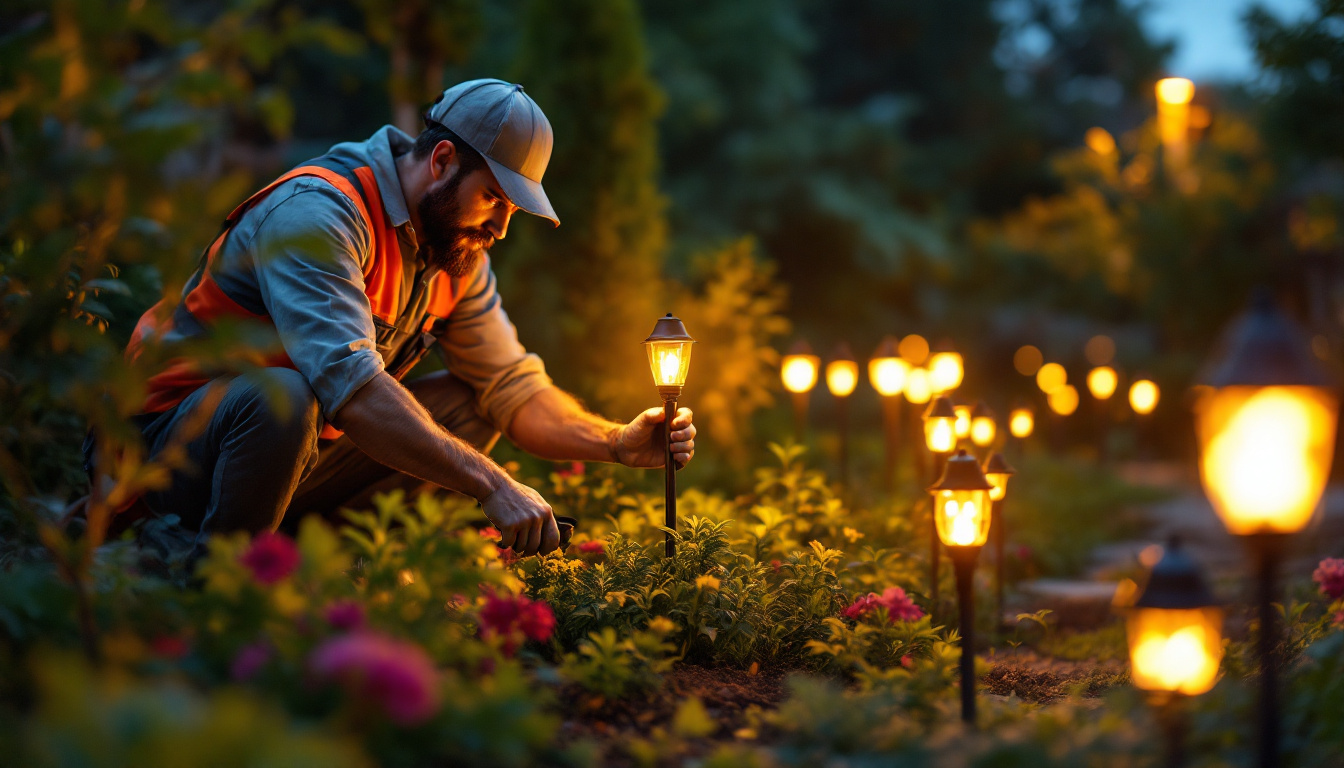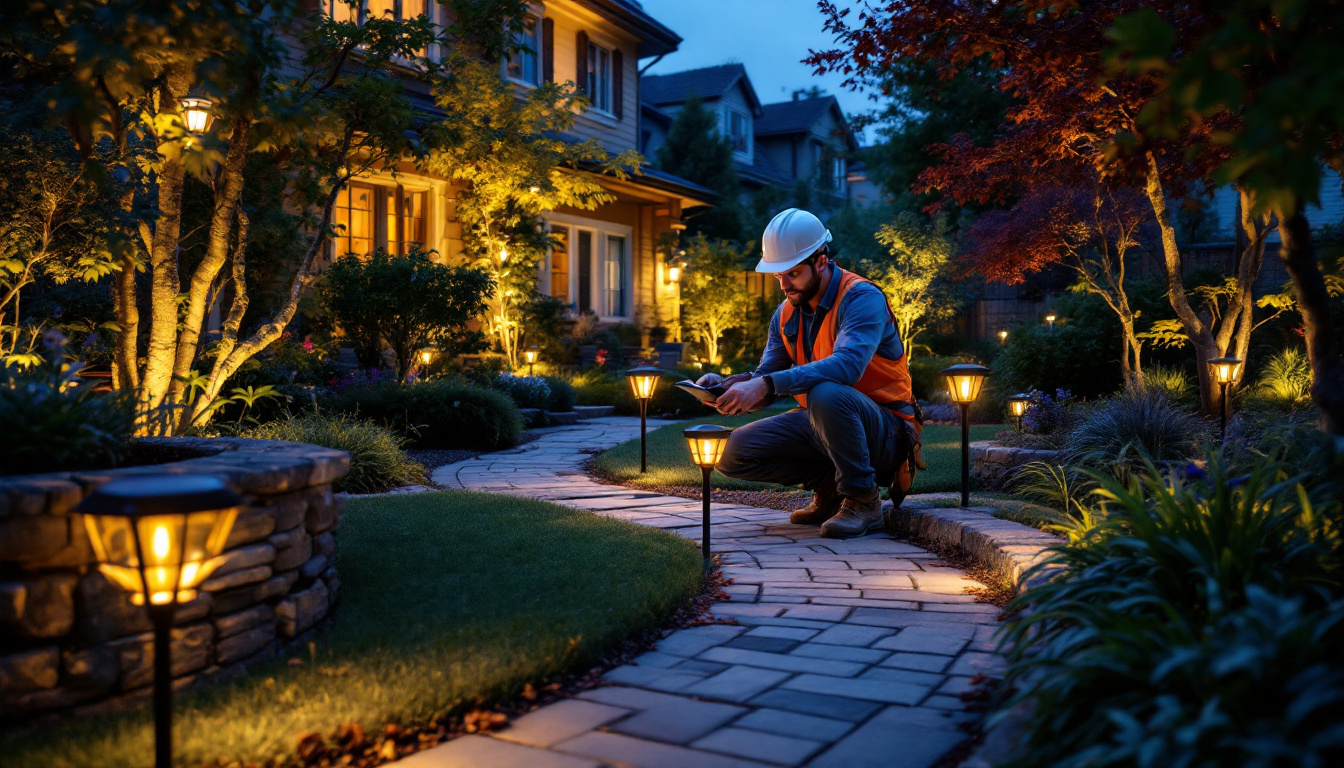
As the demand for sustainable energy solutions continues to rise, solar garden lights have emerged as a popular choice for both residential and commercial landscapes. Lighting contractors play a crucial role in the installation and maintenance of these systems, but navigating the complexities of solar technology can present challenges. This article outlines key considerations for lighting contractors to ensure successful solar garden light installations while avoiding common pitfalls.
Before delving into installation techniques, it is essential for lighting contractors to have a solid grasp of how solar technology works. Solar garden lights harness energy from sunlight, converting it into electricity through photovoltaic cells. This energy is stored in batteries, allowing the lights to operate during the night. Understanding this fundamental process is vital for effective installation and troubleshooting. The efficiency of solar technology has significantly improved over the years, making it a more viable option for outdoor lighting solutions. With advancements in solar panel design and battery technology, contractors can now offer clients more reliable and longer-lasting lighting options that require minimal maintenance.
Solar garden lights typically consist of several key components: the solar panel, battery, LED light, and control circuitry. Each component plays a specific role in the overall functionality of the light. The solar panel captures sunlight and converts it into electrical energy. The battery stores this energy for nighttime use, while the LED light provides illumination. Control circuitry manages the charging and discharging processes, ensuring optimal performance. Additionally, some solar garden lights are equipped with sensors that detect ambient light levels, allowing them to automatically turn on at dusk and off at dawn, thereby conserving battery life and enhancing user convenience.
Familiarity with these components allows contractors to make informed decisions when selecting products and troubleshooting issues. For instance, understanding the battery’s capacity can help in determining how long the lights will operate on a full charge. Moreover, knowing the efficiency ratings of solar panels can assist in predicting how much light can be generated in varying weather conditions, which is crucial for ensuring that clients have reliable lighting throughout the year.
There are various types of solar garden lights available, each designed for different applications. Pathway lights, spotlights, and decorative fixtures serve distinct purposes and come with varying features. Lighting contractors should consider the specific needs of their clients when selecting the appropriate type of solar light. Each type of light can also vary in brightness, design, and battery life, which can influence the overall aesthetic and functionality of the outdoor space.
For example, pathway lights are ideal for illuminating walkways, while spotlights can highlight architectural features or landscaping elements. Decorative fixtures may serve both functional and aesthetic purposes, enhancing the overall ambiance of a garden or outdoor space. Additionally, some solar lights come with adjustable brightness settings or color-changing capabilities, allowing homeowners to customize their outdoor lighting experience based on the occasion or personal preference. Understanding these nuances can empower contractors to provide tailored solutions that meet the unique demands of each project, ensuring satisfaction and enhancing the outdoor environment for their clients.
While solar garden lights offer numerous benefits, installation can pose challenges. Lighting contractors must be prepared to address common issues that can arise during the installation process. Awareness of these challenges will enable contractors to provide better service and avoid potential setbacks.
A thorough site assessment is crucial before installation begins. Factors such as shading from trees or buildings, soil conditions, and the orientation of the solar panels can significantly impact the performance of solar garden lights. Lighting contractors should evaluate the site to identify potential obstacles and determine the best locations for light placement.
Inadequate sunlight exposure can lead to insufficient charging of the batteries, resulting in poor performance. Therefore, it is essential to choose locations that receive ample sunlight throughout the day. Additionally, contractors should consider the aesthetic aspects of the installation, ensuring the lights complement the surrounding landscape. The visual appeal can enhance the overall atmosphere of the garden or outdoor space, making it more inviting for both residents and guests. Moreover, understanding the seasonal changes in sunlight can aid in making informed decisions about placement, as certain areas may receive more light during specific times of the year.
The choice of battery is another critical factor in the performance of solar garden lights. Different types of batteries, such as lead-acid, nickel-cadmium, and lithium-ion, offer varying capacities and lifespans. Lighting contractors should select batteries that align with the specific requirements of the solar lights being installed.
Furthermore, proper battery management is essential for ensuring longevity and performance. Contractors should educate clients on the importance of regular maintenance and monitoring battery health. This includes checking for corrosion, ensuring connections are secure, and replacing batteries when necessary. Additionally, understanding the charging cycles and discharge rates of different batteries can help contractors advise clients on optimal usage patterns. For instance, some batteries may perform better when fully charged and discharged regularly, while others may benefit from partial discharges. By providing this knowledge, contractors can empower clients to maximize the efficiency of their solar garden lights, leading to a more satisfying and sustainable lighting solution.
Once solar garden lights are installed, ongoing maintenance is crucial for optimal performance. Lighting contractors should provide clients with clear guidelines on how to care for their solar lights to prevent issues down the line.
Regular cleaning of solar panels is essential for maintaining efficiency. Dust, dirt, and debris can accumulate on the surface, blocking sunlight and reducing the energy captured. Contractors should recommend a cleaning schedule to clients, emphasizing the importance of using non-abrasive materials to avoid damaging the panels.
In addition to cleaning the solar panels, contractors should also advise clients to inspect the fixtures and wiring periodically. This proactive approach can help identify potential issues before they escalate, ensuring the solar garden lights remain functional and effective.
Seasonal changes can impact the performance of solar garden lights. In regions with significant seasonal variations, lighting contractors should educate clients on adjusting their systems accordingly. For instance, during winter months, when daylight hours are shorter, clients may need to reposition lights or consider using models with enhanced battery capacity.
Additionally, contractors should inform clients about the potential effects of snow or ice accumulation on solar panels. In snowy climates, it may be necessary to clear snow from the panels to ensure they can capture sunlight effectively.
Despite careful planning and installation, issues may still arise with solar garden lights. Lighting contractors should be equipped to troubleshoot common problems that clients may encounter.
One of the most common complaints regarding solar garden lights is poor illumination. This can be attributed to several factors, including insufficient sunlight exposure, faulty batteries, or damaged LED lights. Contractors should first assess the location to ensure that the lights are receiving adequate sunlight during the day.
If sunlight exposure is not an issue, the next step is to check the battery and LED components. Replacing a faulty battery or LED can often resolve illumination problems. Contractors should also remind clients that certain models may have adjustable brightness settings, which can be modified to enhance illumination levels.
Another frequent issue is short battery life, which can be frustrating for clients. This problem may stem from several sources, including poor battery quality, insufficient charging time, or excessive drain from the LED lights. Contractors should educate clients about the importance of selecting high-quality batteries and ensuring that the solar panels receive adequate sunlight for charging.
If clients experience persistent battery issues, it may be worthwhile to consider upgrading to a more efficient battery type. Lithium-ion batteries, for example, often provide longer lifespans and better performance compared to traditional lead-acid batteries.
As technology continues to evolve, the solar garden lighting industry is poised for exciting advancements. Lighting contractors should stay informed about emerging trends to remain competitive and offer the best solutions to clients.
One notable trend is the integration of smart technology into solar garden lights. These innovative systems allow users to control their lights remotely through smartphone applications. Features such as scheduling, dimming, and motion detection enhance convenience and energy efficiency.
Contractors should familiarize themselves with these smart systems to provide clients with cutting-edge solutions. Offering smart solar lights can also set contractors apart from competitors, positioning them as leaders in the industry.
Another trend is the growing emphasis on aesthetics in solar garden lighting. Manufacturers are increasingly focusing on creating stylish designs that blend seamlessly into outdoor environments. Lighting contractors should keep an eye on the latest design trends to offer clients a range of options that enhance the visual appeal of their landscapes.
From modern minimalist designs to vintage-inspired fixtures, there is a solar garden light to suit every taste. By providing clients with aesthetically pleasing options, contractors can help elevate the overall ambiance of outdoor spaces.
Solar garden lights present a sustainable and efficient lighting solution for outdoor spaces. However, lighting contractors must navigate various challenges to ensure successful installations and satisfied clients. By understanding solar technology, addressing common installation issues, and staying informed about industry trends, contractors can avoid potential pitfalls and enhance their service offerings.
Ultimately, a proactive approach to maintenance, troubleshooting, and client education will not only improve the performance of solar garden lights but also foster long-term relationships with clients. As the demand for solar solutions continues to grow, lighting contractors who embrace these principles will position themselves for success in the evolving landscape of outdoor lighting.
Ready to elevate your solar garden lighting installations with premium products that promise both sustainability and efficiency? Look no further than LumenWholesale, where we provide lighting contractors with the highest quality, spec-grade lighting solutions at unbeatable wholesale prices. Say goodbye to local distributor markups and hello to our extensive selection that meets rigorous industry standards. Plus, enjoy the convenience of free shipping on bulk orders, ensuring you get the best value without any hidden costs. Make your next project shine brighter by choosing Wholesale Lighting at the Best Value with LumenWholesale.

Discover the essential insights on garage hanging lights as we tackle lighting contractors’ most common questions.

Discover the pros and cons of light plugs vs. alternatives for lighting contractors.

Discover the essential do’s and don’ts for lighting contractors when installing backyard solar lights.

Discover the ultimate guide to LED sconces, exploring their benefits, styles, and installation tips.